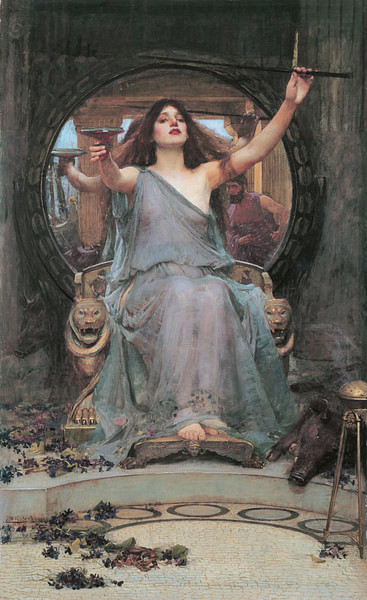
Circe (also spelt Kirké) is a powerful sorceress and goddess in Greek mythology with an exceptional talent for mixing drugs. She was the daughter of the sun god Helios and the Oceanid Perseis. Circe's home was found on the wooded island of Aeaea and was guarded by men she had turned into wolves and lions.
Despite having no particular love for humankind, Circe famously found herself embroiled with the hero Odysseus after he and his men arrived on her island. She is also responsible for turning the beautiful nymph Scylla into a fearsome sea monster. In the Aeneid by Virgil (70-19 BCE), Aeneas sails right past her island after he had been warned to avoid her by Odysseus' men.
Birth & Family
Circe was the beautiful daughter of the sun-god Helios and the Oceanid Perseis: "The famous daughter of Ocean, Perseis, Bore to her mate, untiring Helios, Circe and King Aeëtes." (Hesiod, Theogony 954-956). She was the sister of King Aeëtes of Colchis and Pasiphae, the queen of Crete and a fellow sorceress. She was also the aunt of Medea, yet another sorceress.
The Sorceress
Circe was a fearsome but beautiful goddess, a witch who bewitched men with her voice. She was also talented at working the loom. She had a way with magical drugs and often turned men into beasts for her entertainment or as revenge.
Circe was taken to the island of Aeaea in Helios' chariot (some say as punishment for her husband's death). The island was described as wild with heavy woods. It was inhabited by lions and wolves who had once been men until Circe's magical drugs had taken effect. Classical writers identify the island with Cape Circeium on the western coast of Italy.
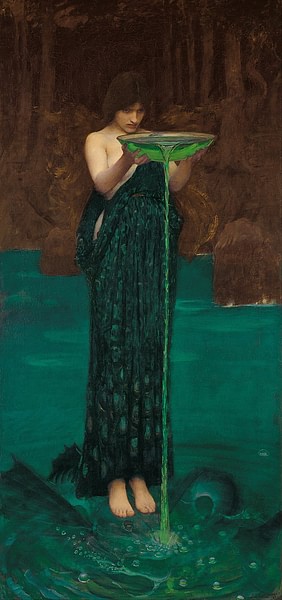
In his Odyssey, Homer (c. 750 BCE) describes Circe as a fearsome goddess with a human voice and describes her beautiful hair. Homer also gives her the epithet Polypharmakos ("knowing many drugs or charms"). In Ovid's (43 BCE to 17 CE) Metamorphoses, she is portrayed as seated regally on a throne, dressed in gold. In art, she is often portrayed as a beautiful woman with a cup raised high, a symbol of her magical potions and incantations.
Circe & Odysseus
The most famous myth surrounding Circe can be found in Homer's Odyssey and involves the Greek hero Odysseus. After losing all his ships but one, an exhausted Odysseus and his men reached the island of Aeaea. They stayed on the shore for a few days, hoping to avoid the dangerous witch Circe, until Odysseus realised they needed to send out a scouting party. He and his second-in-command, Eurylochus, split the men into two groups and drew lots. Eurylochus and his group of men set off to scout the island. They reached Circe's palace deep in the woods, surrounded by mountain lions and wolves. Although they were scared of these beasts, they were drawn closer to the enchanting voice they heard coming from inside the palace. The men called out to this beautiful voice, and Circe appeared at the door and invited them inside. Only Eurylochus stayed outside as he had sensed a trap.
Circe made the men sit at her table and served them a mixture of cheese, barley and honey mixed in Pramnian wine. The men greedily drank, unaware that she had mixed some of her special drugs into the mixture. Once they had finished drinking, Circe struck them with her wand, turning them into pigs and driving them into pigsties. Eurylochus watched all this in horror and ran back to the ship to tell Odysseus. Odysseus armed himself and asked Eurylochus to lead him to Circe, but a terrified Eurylochus refused.
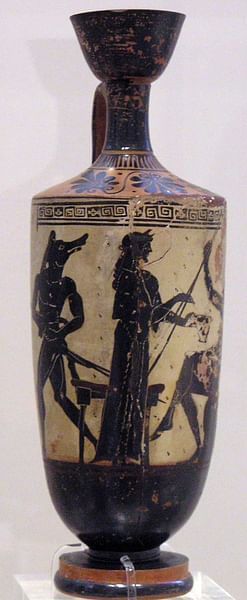
Odysseus set off by himself but was stopped by Hermes, who offered him help. He gave Odysseus a magic herb that the gods called moly (a mythical plant with a white flower and a black root). Finally, Odysseus reached Circe's palace and was welcomed inside.
She heard my voice,
she opened her gleaming doors at once and stepped forth,
inviting me in, and in I went, all anguish now…
She led me in to sit on a silver-studded chair,
ornately carved, with a stool to rest my feet,
In a golden bowl she mixed a potion for me to drink,
stirring her poison in, her heart aswirl with evil.
And then she passed it on, I drank it down
but it never worked its spell.(Homer, Odyssey, 10.346-354)
Circe was confused when her poison did not work on Odysseus. Seeing his chance, Odysseus rushed at her with a knife in his hand, intent on killing her. In a ploy to distract him, Circe told Odysseus that she had heard about him and invited him to her bed. Odysseus first made her swear a solemn oath not to harm him and agreed. Odysseus and his men (who had all been transformed back into human form by Circe) stayed with Circe for a year, feasting and drinking. Soon, Odysseus' men became restless and urged him that it was time to leave Aeaea and go home. Odysseus pleaded with Circe to help him, and she agreed but told him that there was one place he must visit first: Hades. He needed to see Tiresias, the blind prophet of Thebes who would tell Odysseus what fate awaited him in Ithaca. Circe told Odysseus how to reach the underworld safely and bid him and his men farewell.
Odysseus and his men returned to Aeaea and Circe after their adventure in Hades. Circe informed them that they would have to sail past the island of the Sirens and gave them instructions on how to pass them safely. She then sent Odysseus and his men off for a final time on a favourable wind.
According to classical tradition, Circe and Odysseus' relationship resulted in three children (Telegonus, Agrius and Latinus), although some sources only mention one (Telegonus). Circe sent Telegonus to find Odysseus, who was in Ithaca. Arriving, Telegonus killed some cattle, and Odysseus defended them, not knowing that Telegonus was his son. Unfortunately, Telegonus wounded Odysseus with a spear that was tipped with a needle from a stingray, and Odysseus died. Telegonus was distraught when he found out he had killed his father and took his body and Odysseus' wife Penelope back to Circe, where he married her. In some sources, Circe also married Telemachus, the son of Odysseus and Penelope.
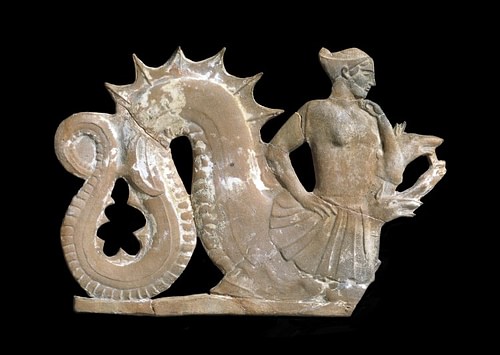
Circe & Scylla
Circe plays a crucial role in Scylla's transformation into a sea monster which is told in Ovid's Metamorphoses. Glaucus, a sea god, had made advances towards the beautiful sea nymph but was rejected. An enraged Glaucus decided to pay Circe a visit and told her of his passion for Scylla, begging her to make a potion so that Scylla would return his love. But Circe had a different plan:
To banish all doubt and distrust you may have in your
power to attract,
look into my eyes. I may be a goddess, the daughter born
to the gleaming Sun; the power of my spells and my herbs
may be great;
but I pray that I may be yours. Reject the one who rejects
you,
respond to her who pursues you.(Ovid, Metamorphoses, 14.32-36)
Glaucus turned down her advances and told Circe that while Scylla was still alive, his love for her would not falter until trees grew in the ocean or until seaweed sprouted on mountains. Circe was hurt by his admission but knew she could not take her anger out on him, as her love for him was too great. So instead, she turned her wrath towards Scylla.
She mixed a potion using some plants with sinister properties and chanted her spells over them. Then, donning a sea-blue cloak, she left her home and travelled to Scylla's sea pool, where she liked to bathe. Circe poured her monster-producing poisons into the water and spoke her mysterious spell out loud. It was not long before Scylla appeared at the pool, oblivious to what awaited her. She was waist-deep until she noticed that her lower half had turned into rabid dogs and that she had transformed into a fearsome creature. Glaucus wept when he found out what Scylla had become, and Scylla showed her hatred for Circe by attacking Odysseus and his men. She would have also destroyed the Trojan ships if she had not been transformed into a rocky headland that still makes sailors wary to this day.
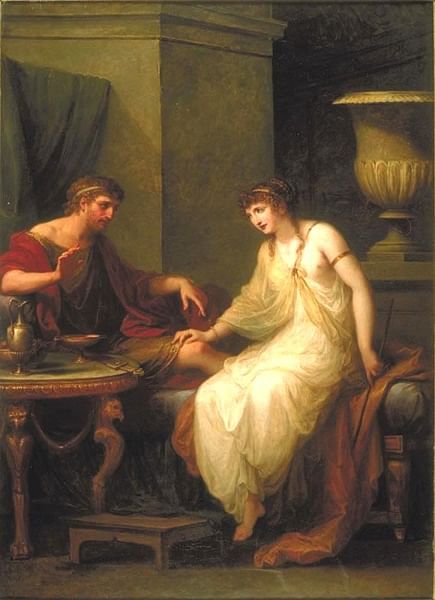
Circe, Medea & Jason
Circe's niece Medea and her lover, the Greek hero Jason, had violently slain Medea's brother Apsyrtus in an attempt to distract Medea's father, King Aeëtes, as they fled from him. Zeus told them that they would be cursed to sail the seas forever unless Medea was cleansed by Circe.
They reached Circe's island and found her working at her loom. Circe had had a vision of blood and a feeling of doom which only strengthened with the arrival of Jason and Medea. She recognised Medea as her blood and listened in horror as they recounted Apsyrtus' death. Circe purified Jason and Medea with pure water, seawater, and the blood of a young sow but refused to show them further hospitality after the purification was completed. In some sources, she declined to purify them at all after she found out what they had done.
Circe & Picus
Circe often turned men who had scorned her into animals, and the story of Picus is no exception. Picus was the son of Saturn and the king of Latium. His handsome features were widely admired by all those who met him, including Circe, who was not immune to his good looks. She happened to chance upon him in the woods one day, and his beauty took her breath away. She conjured up an illusion of a boar to get Picus on his own and ambush him.
I appeal to you, Picus, she said, by your eyes which
have captured my own,
by your beauty, most handsome of men, which
compels me, though I am a goddess,
to kneel at your feet, be kind to my passion. Accept the all-seeing
Sun as your father, don't cruelly scorn the Titaness Circe!(Ovid, Metamorphoses, 14.372-376)
Picus rejected Circe, stating that he was in love with another, Canens, the daughter of Janus. Circe warned him that his rejection would have harsh consequences and struck him with her wand while chanting three spells, turning him into a woodpecker.
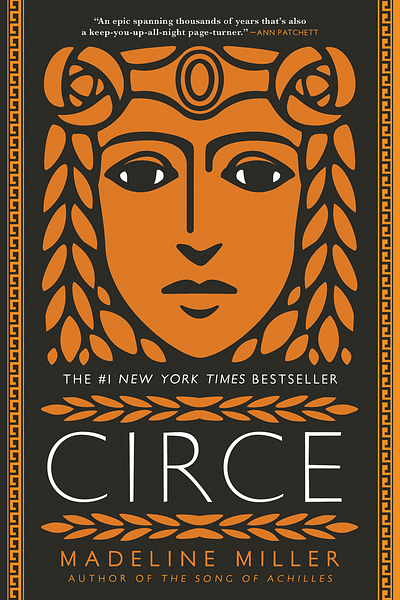
Worship & Legacy
Circe received divine honours in the ancient world and was said to have had a monument dedicated to her on one of the Pharmacussae islands near Salamis. Monte Cicero in Italy is also said to be named after her.
Circe inspired many artists, including Annibale Carracci (1560-1609), Edward Burne-Jones (1833-1898), and John William Waterhouse (1849-1917). She also has multiple operas, spanning from the 1600s to modern times, written about her. In addition, an asteroid discovered in 1855 was named after her.
In modern times, Circe is the name of Wonder Woman's enemy in the DC Comics, where she also has encounters with Batman and Superman. Circe (2018) is also a hugely popular book by author Madeline Miller and is set to be adapted into a TV series. In the book, she is portrayed as a much more sympathetic character than her ancient depictions, and true to changing times, Circe has become a feminist symbol and an example of a powerful woman.







